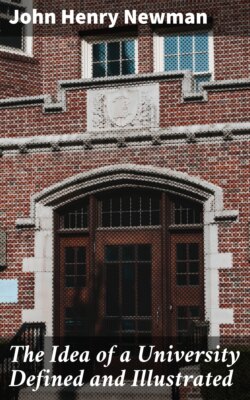Читать книгу The Idea of a University Defined and Illustrated - John Henry Newman - Страница 33
На сайте Литреса книга снята с продажи.
9.
ОглавлениеTable of Contents
And here I am led to another and most important point in the argument in its behalf,—I mean its wide reception. Theology, as I have described it, is no accident of particular minds, as are certain systems, for instance, of prophetical interpretation. It is not the sudden birth of a crisis, as the Lutheran or Wesleyan doctrine. It is not the splendid development of some uprising philosophy, as the Cartesian or Platonic. It is not the fashion of a season, as certain medical treatments may be considered. It has had a place, if not possession, in the intellectual world from time immemorial; it has been received by minds the most various, and in systems of religion the most hostile to each other. It has primâ facie claims [pg 068] upon us, so imposing, that it can only be rejected on the ground of those claims being nothing more than imposing, that is, being false. As to our own countries, it occupies our language, it meets us at every turn in our literature, it is the secret assumption, too axiomatic to be distinctly professed, of all our writers; nor can we help assuming it ourselves, except by the most unnatural vigilance. Whoever philosophizes, starts with it, and introduces it, when he will, without any apology. Bacon, Hooker, Taylor, Cudworth, Locke, Newton, Clarke, Berkeley, and Butler, and it would be as easy to find more, as difficult to find greater names among English authors, inculcate or comment upon it. Men the most opposed, in creed or cast of mind, Addison and Johnson, Shakespeare and Milton, Lord Herbert and Baxter, herald it forth. Nor is it an English or a Protestant notion only; you track it across the Continent, you pursue it into former ages. When was the world without it? Have the systems of Atheism or Pantheism, as sciences, prevailed in the literature of nations, or received a formation or attained a completeness such as Monotheism? We find it in old Greece, and even in Rome, as well as in Judea and the East. We find it in popular literature, in philosophy, in poetry, as a positive and settled teaching, differing not at all in the appearance it presents, whether in Protestant England, or in schismatical Russia, or in the Mahometan populations, or in the Catholic Church. If ever there was a subject of thought, which had earned by prescription to be received among the studies of a University, and which could not be rejected except on the score of convicted imposture, as astrology or alchemy; if there be a science anywhere, which at least could claim not to be ignored, but to be entertained, and either distinctly accepted or [pg 069] distinctly reprobated, or rather, which cannot be passed over in a scheme of universal instruction, without involving a positive denial of its truth, it is this ancient, this far-spreading philosophy.
